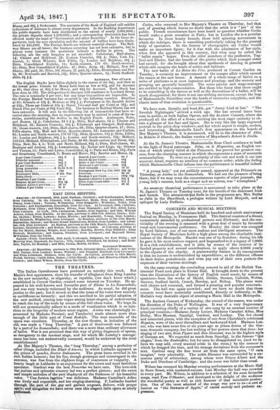THE THEATRES.
The Italian Operahouses have produced no novelty this week. But Mario's first appearance, since his transfer of allegiance from King Lumley to the new monarchy, or oligarchy, or republic, (we don't know which,) established in Covent Garden, created some interest on Tuesday. He ap- peared in his well-known and favourite part of Elvin(' in La Sonnambula; and was very warmly welcomed by the audience. As usual, he did great justice to the part; but it struck us that the tones of his voice were scarcely so mellifluous as formerly: and this we ascribed to his partial adoption of the new method, coining into vogue among tenor-singers, of endeavouring to reach the top of the scale by means of the full chest-voice. We hope he will not systematically adhere to a mode of vocalization which is so inju- rious to the longevity of modern tenor organs. Amen was charmingly re- presented by Madame Persiani; and Tamburini made almost more than enough of the little part of Count Rodolfo. The tout ensemble of the opera was excellent. Thursday, at the new theatre, in imitation of the old, was made a "long Thursday." A part of Semiramide was followed by a part of La Sormambula; and there was a more than ordinary allowance of ballet. Was it not promised that this way of giving fragments of operas, so derogatory to the musical stage, and for which Mr. Lumley's manage- ment has been not undeservedly censured, would be eschewed by the rival establishment?
At Her Majesty's Theatre, the " long Thursday," among a profusion of other things, included the Elisir d'Amore; in which Lablache appeared as the prince of quacks, Doctor Dukamara. The great basso revelled in his rich Italian humour; but his fun, though grotesque and extravagant in the extreme, was free from the slightest tinge of coarseness or vulgarity. A hearty laugh at Lablache is an enjoyment for the nicest and most fastidious spectator. Gardoni was the best Nemorino we have seen. The love-sick but jealous and splenetic country lad was a perfect picture; and the sweet and simple melodies of the part displayed all the freshness of his beautiful voice. " Una furtive lagrima " was delicious. Madame Castellan's Adina was lively and coquettish, and her singing charming. F. Lablache bustled through the part of the gay and gallant sergeant, Bekore, with proper spirit; and altogether we have never seen this elegant little opera so nicely performed. Cerito, who returned to Her Majesty's Theatre on Thursday, had that sort of greeting which leaves no doubt that the artist is a " pet" of the public. French connoisseurs have been heard to question whether Cerito would make a great sensation in Paris; but in London she is a peculiar favourite. In those hearty bounds those bold spinning movements in which she indulges, there is something particularly taking for the general body of spectators. In the history of choregraphic art Cerito would make an important figure; for it was with the admiration of her style, ' when first she appeared in this country, that what may be called the ballet mania" began. Even the older members of the profession, Tag- lioni and Elssler, had the benefit of the glories which their younger sister had earned; for she. brought about that apotheosis of dancing in general which still occupies the heads of critics and habitues.
The new ballet of La Reins des Fees, produced at Covent Garden on Tuesday, is certainly an improvement on the meagre affair which opened the season at the new house. A descent of a whole troop of fairies on a series of platforms is at once ingenious and pleasing; and the scenery and grouping are generally beautiful. The scene painter and stage-manager are entitled to high commendation. But those who fancy that there ought to be something in the dances as well as the decorations of a ballet, will be much disappointed; for there is not one striking movement, except the leap of Mademoiselle Dumilfttre over the heads of successive coryphees; and the classic taste of that evolution is questionable.


























 Previous page
Previous page